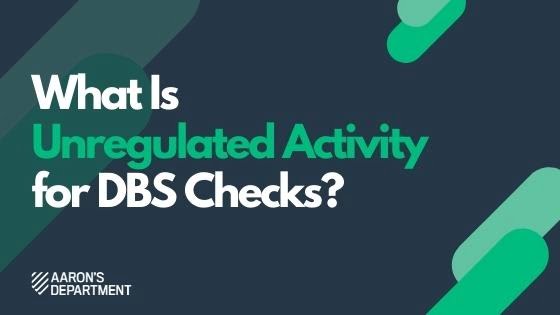What is Unregulated Activity?
By definition, Unregulated Activity is simply anything that isn’t classified as Regulated Activity. By default, job roles are Unregulated Activity unless stated otherwise. In schools, unregulated activity is simply anything that isn’t a regulated activity.
What is Regulated Activity?
Since Unregulated Activity is simply defined as “anything that isn’t Regulated Activity”, it’s helpful to understand what Regulated Activity is.
Regulated Activity is work that a “barred” person must not do. As defined in the Safeguarding Vulnerable Groups Act, 2006.
A person engaging in Regulated Activity would need an Enhanced DBS Check with Barred List Check to ensure that they were not “barred” (prevented) from working in that capacity.
If someone is working with children and/or vulnerable adults, they’ll require a different type of Enhanced DBS check to someone who doesn’t. This is determined by the rules and regulations surrounding Regulated & Unregulated Activity.
What Are Some Examples of Roles Including Regulated Activity?
Regulated Activity can be broken down into two separate groups: Regulated Activity with adults, and Regulated Activity with children.
Regulated Activity With Children
When working with children, Regulated Activity includes, but is not limited to:
- Personal care
- Providing healthcare
- Foster care, or registered childminding,
- Teaching, training, coaching or mentoring,
- Any work taking place in a Specified Place* (e.g.: schools, nurseries or children’s hospitals), or where the person will have unsupervised contact with children for more than 3 days in a 30-day period.
*Specified Place is the legislative term used in this context for “anywhere we might reasonably expect to find children”
- Managing or directly supervising the day-to-day activities of anyone who is involved in Regulated Activity


Regulated Activity With Vulnerable Adults
A vulnerable adult is defined by the Department of Health as a person, aged 18 or over, who requires care services, because of a disability, age, or illness. Such people are considered vulnerable if they are unable to look after themselves, protect themselves from harm or exploitation, or are unable to report abuse.
This can lead to some confusion because the legal term Vulnerable Adults doesn’t cast anywhere near as broad a net as the words “vulnerable adults” imply.
Here’s an example we see a lot: Most of us would consider the homeless to be “vulnerable adults”, but they don’t actually meet the limited legal definition used by the DBS. We’ll get charities requesting an Enhanced DBS with Adult’s Barred List check, to work with the homeless, but the applicants aren’t actually eligible.
Regulated Activity with Vulnerable Adults consists of, but is not limited to, activities involving:
- Healthcare being given to a Vulnerable Adult.
- Social work, where assistance is being given with shopping or paying bills on behalf of the Vulnerable Adult.
- When someone through formal appointment is helping a Vulnerable Adult conduct their own affairs (lasting or enduring power of attorney, as an advocate under Mental Health Capacity Act, etc).
You can read more about Regulated Activity on our dedicated page.
So, now that you know the ins and outs of Regulated Activity, you can work out what constitutes Unregulated Activity!
The government guidelines we’ve followed are available at the links below:
Working with Vulnerable Adults
Working with Children


Conclusion – Unregulated Activity:
In conclusion, Unregulated Activity is simply anything that isn’t classified as Regulated Activity. Regulated Activity is something that a Barred Person should not undertake.
Whether your staff/volunteers will be partaking in Regulated, or Unregulated Activity, you can get their Enhanced DBS Check (with or without the Barred List) by signing up using the buttons below.
If you are still unsure about what level of check is needed when applying through us, we’re more than happy to help.
Simply give us a call on 0113 877 0171, and one of our experienced team members will be happy to discuss it with you! Our team is available Monday to Friday, between 8am and 5pm.


If you’re looking for an Umbrella Body to get your DBS checks with, that’s our business! We’ll quickly go over some of the benefits of getting your DBS checks with Aaron’s Department:
- Low-cost DBS check admin fees, starting at £5.45 for a Basic DBS.
- Our 3-step, registration process is fast and free – you could have your DBS results within hours of signing up.
- Built-in tracking system for easy monitoring of applications’ progress.
- Our error-proof system identifies mistakes in real-time, giving users the chance to fix them – incorrect details can lead to the DBS rejecting applications, so we’ve designed a system to avoid that happening!
- Free DBS fast-track: every check we receive before 4pm on a weekday is checked, countersigned, and sent on to the DBS the very same day. The faster we do that, the faster you get your check back.
- Knowledgeable & experienced customer support, along with expert eligibility guidance.
Like we say, if you’re interested, or just need some DBS guidance, simply give us a call on 0113 877 0171, or drop us an email at contact@aaronsdepartment.com, and we’ll do our best to help you and your DBS application sent off as soon as possible!
Further Reading
For further reading on DBS related issues, why not take a look at some of our other related articles. Common DBS Check Mistakes And How To Avoid Them or How Long Is A DBS Check Valid For?

Looking to be a provider of unregulated supported accommodation for 16 to 21 need guidance
Hi Kutala, For further advice, please call our support team on 0113 877 0171.
Thank you